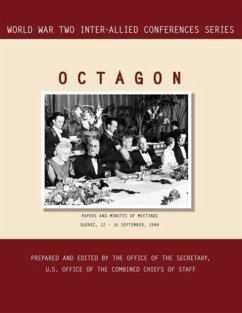During World War II, President Franklin D. Roosevelt and Prime Minister Winston S. Churchill formulated allied grand strategy at a series of high-level conferences held in Washington, DC, Casablanca, Quebec, Cairo, Tehran, Yalta, and Potsdam. At the Tehran, Yalta, and Potsdam conferences, the Russian leader, Joseph Stalin, also played a major role. Under policy guidance from their national leaders, the newly formed US Joint Chiefs of Staff and their British counterparts, known collectively as the Combined Chiefs of Staff, hammered out the military details of allied strategy. The minutes of the Combined Chiefs' meeting at the major conferences touch on virtually every policy and strategy issue of World War II, from initial troop deployments to counter Axis aggression, through the debates about the location and timing of the principal Anglo-American offensives, to the settlement of post-war occupation boundaries. Besides being an invaluable primary source on the early years of the Joint Chiefs of Staff and on the planning and conduct of World War II, these documents also offer insights for today on the problems of managing a global coalition war. Originally highly classified documents, the minutes were declassified on October 3, 1973. OCTAGON (Quebec, 12-16 September 1944). Roosevelt, Churchill, and their military chiefs of staff convened in the last of their mid-war conferences. They agreed on British and American occupation zones in Germany. Roosevelt and Churchill initialed the Morgenthau Plan for post-war German de-industrialization. Decisions on the Pacific war included approval of the U.S. invasion of Leyte and plans for British fleet participation in the final campaigns against Japan.
Hinweis: Dieser Artikel kann nur an eine deutsche Lieferadresse ausgeliefert werden.
Hinweis: Dieser Artikel kann nur an eine deutsche Lieferadresse ausgeliefert werden.








